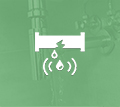HOW CAN WATER CHEMISTRY AFFECT YOUR HOME’S PLUMBING?
Many factors can impact the efficiency and longevity of your home’s plumbing system. One of these is water chemistry. Water chemistry can have a big influence on the rate of corrosion, scale formation, and the overall function of plumbing components in your home.
Here are some of the ways water chemistry can affect your plumbing:
CORROSION
Corrosion occurs when the material a pipe is constructed reacts to materials in the water. The reaction causes degradation to the pipe. Over time, corrosion can result in leaks and other problems.
Water with a low pH (acidic water) can cause corrosion of metal pipes, leading to leaks and the release of metal ions into the water supply. Acidic water is particularly damaging copper and lead pipes. Chlorine and other oxidizing can increase the rate of corrosion in metal pipes.
Oxygenated water can enhance oxidation, forming rust in iron and steel pipes. High levels of dissolved carbon dioxide (CO2) can lower the pH of water, affecting both corrosion and scaling.
CHEMICAL REACTIONS
Galvanic corrosion occurs when two different metals are in contact in the presence of an electrolyte (such as water), a galvanic reaction can occur, causing accelerated corrosion of the more anodic metal.
SCALE FORMATION
High concentrations of calcium, magnesium, and other minerals can result in hard water, which can lead to the formation of scale (calcium carbonate deposits) inside pipes, water heaters, and appliances. This scale buildup reduces water flow, decreases heating efficiency, and can cause blockages. Higher water temperatures can accelerate the precipitation of calcium and magnesium, accelerating scale formation in hot water systems.
BIOFILM FORMATION
Water with high levels of organic matter or certain nutrients can promote the growth of biofilms inside pipes. These biofilms can harbor harmful bacteria and reduce water quality.
SEDIMENT AND PARTICULATES
Water can carry sediments and other materials that can settle in pipes and appliances, causing abrasion, blockages, and wear on plumbing components.
REDUCING THE CHANCES OF WATER CHEMISTRY-RELATED PLUMBING ISSUES
Understanding and managing water chemistry is crucial for maintaining the integrity and efficiency of home plumbing systems Fortunately, there are several strategies to mitigate the effects water chemistry can have on your home’s plumbing:
- Installing water softeners, pH adjusters, and filtration systems can help balance water chemistry, reduce hardness, and remove harmful contaminants.
- Regular inspection and maintenance of plumbing systems can prevent buildup and identify issues before they become severe.
- Choosing corrosion-resistant materials such as PVC, PEX, or stainless steel for plumbing can reduce the impact of corrosive water.
- Pipe liners can be used to repair and restore pipes damaged due to water chemistry.
PLUMBING REPAIRS IN OCEANSIDE
Corrosion and other damage can cause problems like leaks, low water pressure, clogs, and poor water quality. If you’ve been experiencing any of these problems, contact 1st Choice Plumbing, Flood & Restoration ASAP. We’ve been delivering expert plumbing repairs in Oceanside and surrounding communities since 2012. Our services include emergency plumbing repairs in Oceanside – we’re available anytime you experience a plumbing emergency.










